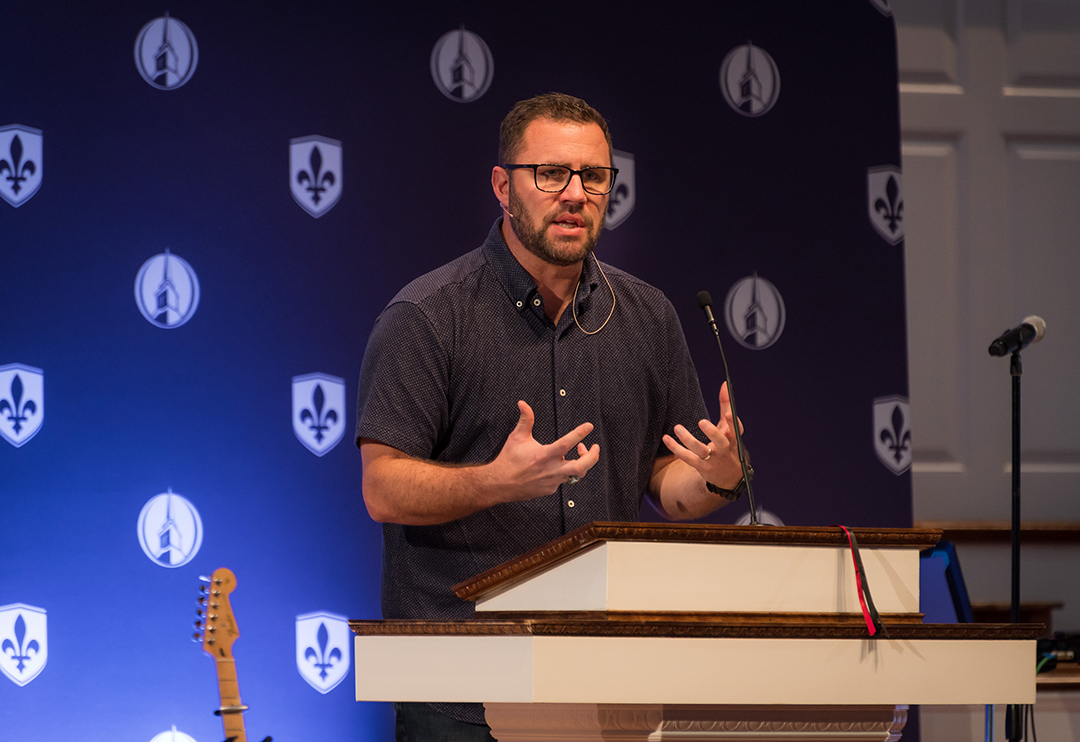
After long months of COVID-19 restrictions, New Orleans Baptist Theological Seminary returned to a regular, in-person chapel schedule Oct. 6. Rather than a celebration, the first service was a sober moment of prayer and reflection.
As the service began, all eyes were on Hurricane Delta, a storm expected to make landfall in Louisiana by week’s end, the third such threat to Louisiana in the last six weeks.
Dew began by calling listeners to a moment of soul-searching and prayer.
“What are you worried about?” NOBTS President Jamie Dew asked of students and faculty. “Is it sickness? Employment? Money? Storms?
Dew acknowledged that 2020 has been “rough” and that when the campus moved to online classes in mid-March due to COVID restrictions, administrators had assumed the impact would be a matter of a few weeks, Dew explained. Masks and social distancing continue to be required for chapel services, classes, and all campus activities.
“As you consider your fear and your worry, let me ask you this question,” Dew continued. “What effort have you given to solving it that’s proven futile?”
Dew challenged listeners to hear Jesus’ words in Matthew 6:25-34 and “consider whether or not God is truly, powerful, is truly good and is truly loving to us.” From the passage, Dew offered four lessons for believers when walking through difficult times.
“First, remember that you cannot fix the problem,” Dew said. “For most of the difficulties that arise in your life, you cannot fix them.”
Knowing nothing can be done to fix a problem should alleviate stress, Dew explained, yet the human tendency is to labor and fret, leading to more futility, anxiety, and sin.
“One of the most effective things the enemy can do to us is to try to overwhelm us,” Dew said. “And there in our overwhelmed state, we find ourselves weak and vulnerable and susceptible to every form of sin.”
While humans cannot avoid worry, Dew explained that Jesus was not offering a “white-knuckled approach” of self-reliance in trials. Instead, Jesus provided specific help that believers can rely on in difficult times, Dew said.
“Remember that God loves you and that God provides for you,” Dew offered as the second lesson from the passage.
The passage’s imagery is that of the Great Teacher who points to nature and uses an “argument from the lesser to the greater,” Dew explained. While birds and flowers are important to God, they are less valuable than people, Dew said.
“This is why we don’t worry,” Dew said. “This is why David could say in Psalm 23, ‘The Lord is my shepherd’ … If the God who created heaven and earth with a simple word chooses to love me and to love you that way, He most certainly will provide … Isn’t that the most amazing truth in all the world? To think that God knows us and loves us.”
The third lesson in the passage is that God already knows the believer’s needs, Dew said.
Sometimes believers pray as if God is unaware and needs “more information” before He can answer, Dew explained, adding that God knows but waits for a believer to come to Him.
“What an amazing thought, that He would bother, that He would care,” Dew said. “That is our God. Remember that He already knows.”
The final lesson from the passage is that in difficulty and trials, believers must first seek God and His kingdom, Dew explained.
“It is often true that believers can survive difficulties when focused on something,” Dew said. When believers set a “laser beam-like focus” on growing closer to Christ in difficulty, they allow the Holy Spirit to produce His fruit until it overflows from their lives, Dew said.
“God owes us nothing,” Dew explained, “but it is a comfort to know that when believers pursue Him and advance the kingdom, as we are designed to do, God will take care of us.”
In conclusion, Dew posed a question. “Has God not been faithful to us? Has He not provided for you?”
Dew’s resounding answer was, “Yes, He has and He will again, today, and tomorrow.”